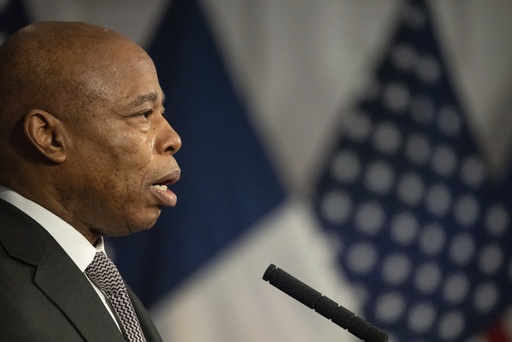
NEW YORK — On Tuesday, Mayor Eric Adams of New York City expressed his commitment to restoring public confidence, coinciding with the Justice Department’s decision to terminate his corruption case. This unexpected action is believed to allow him to focus more on immigration enforcement under the Trump administration’s agenda.
Adams spoke publicly for the first time since federal prosecutors received instructions to drop the charges against him. He conveyed his desire to move past what he termed a “cruel episode” and to concentrate on the city’s future. Without mentioning Donald Trump by name, he praised the Justice Department for its integrity, asserting that his official duties would always take precedence over personal interests.
His remarks at City Hall followed a directive from acting Deputy Attorney General Emil Bove, who advised federal prosecutors in Manhattan to dismiss the bribery allegations “as soon as is practicable.” Bove’s memo posited that the Justice Department concluded the case was politically motivated, emphasizing that the dismissal would permit Adams to allocate his full attention to issues of illegal immigration and violent crime.
Adams, a centrist Democrat, had leaned to the right after his indictment in September, commending Trump and hinting at the possibility of reducing protections for undocumented immigrants in New York City. However, the recent developments have sparked criticism from various quarters, with critics arguing that he may now be under the influence of Trump’s policies. Rev. Al Sharpton, a prominent ally, stated that it appeared Adams was being subjected to political coercion, adding that he has found himself in an unfair situation.
Many Democratic challengers to Adams also expressed concerns about whether he might prioritize Trump’s interests over those of the city’s residents. When queried about the potential compromise of the mayor, Democratic Governor Kathy Hochul remarked, “I truly don’t know.”
The responsibility of implementing the Justice Department’s order now falls to Danielle Sassoon, an experienced prosecutor who recently took over as acting U.S. attorney in Manhattan. Her office has not issued any comments regarding future actions in this case. In a prior letter, prosecutors had previously acknowledged the evidence against Adams’ claims of political motivation, stating they were intended to deflect attention from incriminating proof of guilt.
Sassoon has limited authority to challenge the directive, as the Justice Department can replace her at any time. Trump nominated Jay Clayton, former chairman of the Securities and Exchange Commission, to head the office, this appointment will require Senate confirmation.
According to the guidelines in Bove’s memo, the charges against Adams could still be reintroduced after the mayoral election in November. Bove stated that the dismissal should depend on Adams’ written agreement allowing prosecutors to reinstate the charges if they choose to do so. Consequently, this raises the possibility of renewed legal action looming over Adams as he engages with the Trump administration during his tenure as mayor.
Arlo Devlin-Brown, a former chief of public corruption at the Manhattan U.S. attorney’s office, noted that it is quite rare for a case that has already been charged to be suddenly reversed without significant new evidence.
Despite uncertainties surrounding the case’s future, Adams adopted a tone of vindication in his speech, referring to the legal challenges as an “unnecessary ordeal” that had received excessive media attention. “Who I am is not in the headlines; it’s in my history,” he asserted, reiterating his stance that he has never violated the law.
Federal authorities had accused Adams in September of receiving illegal campaign contributions and luxurious travel perks exceeding $100,000, involving expensive flight upgrades and high-end hotel accommodations during his previous role as Brooklyn borough president. According to the indictment, a Turkish official who facilitated the trips reportedly pressured Adams for favors, such as lobbying the Fire Department to expedite the completion of a new diplomatic building for a scheduled visit by the Turkish president.
Prosecutors further alleged that Adams directed campaign aides to seek foreign contributions, which were subsequently disguised to qualify for a local matching funds program. Such donations from foreign nationals are prohibited under federal election laws. The mayor was originally set to face trial in April.
In addition to the allegations against him, federal inquiries have also targeted several high-profile members of Adams’ administration, resulting in a series of raids and subpoenas that led to the resignations of key officials, including the police commissioner, schools chancellor, and various deputy mayors. The status of these ongoing investigations remains unclear, as does the impact of the department’s directive on individuals connected to Adams who are facing charges.
Recently, federal prosecutors revealed that the city’s chief liaison to the Muslim community would admit guilt for collecting illegal campaign contributions for Adams’ campaign, while a Brooklyn real estate mogul had previously confessed to aiding in routing illegal foreign donations to the mayor. Attorneys representing these individuals have not yet commented on the matter.

